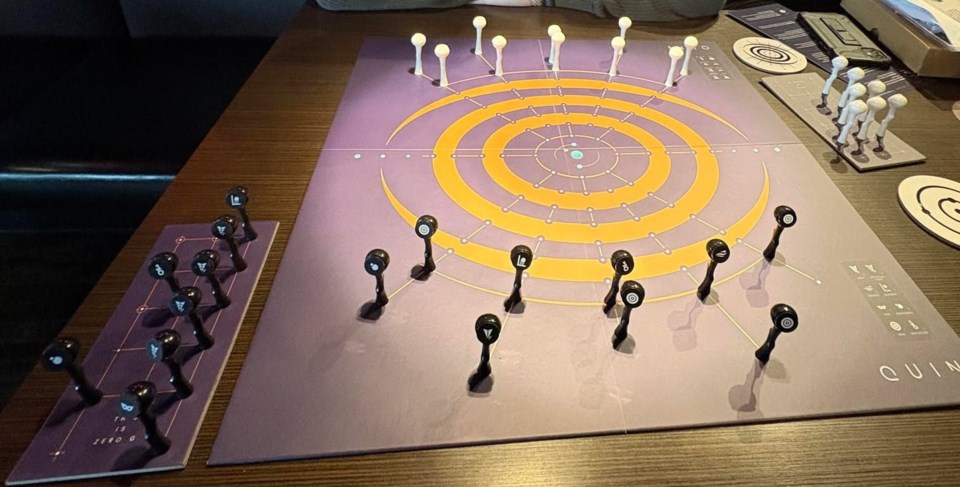YORKTON - When Quin finally made it to The Meeple Guild table it was with a definite level of anticipation.
Everything about the game by designers Brian Rooney, and Taeleen Woodard as it came out of the box was simply first rate, right down to the box insert with a place for everything.
Touted as a modern ‘chess, Quin at least manages that in its look. The pieces have a really modern sort of ‘art nouveau’ look, that truly catch the eye. Put this on the coffee table and it will draw attention.
The pieces are interesting too in that each has a magnet so they actually ‘stick’ to the spots on the board they can move on and off. It’s a neat feature.
Now each player gets 17 pieces, made up of nine types, each with distinct speed, powers and capture abilities, so there is a ton of versatility and a bit of a learning curves here. That said again the rule book is well-done, and a ‘cheat’ card is provided which is hugely helpful.
Players select 10 pieces to place as they see fit on their starting side, the remaining pieces can be brought into play throughout a game.
Having the ability to somewhat customize your starting 10 pieces to your opening play style, and to vary the position of those pieces is simply outstanding.
The game idea sort of emerged out of the blue.
“Way back in 2013, my wife and creative partner Taeleen had a creative vision,” offered Rooney. “There's no other way to say it. In one afternoon she drew up the Quin board and all of the symbols, as well as some of the basic mechanics, like that the game was about getting Light to the center. This all came at once from some alien wormhole or something, and even though it's evolved quite a bit over the years since, polishing and adding in all sorts of sci-fi elements and new play mechanics, those basics have remained almost exactly the same as her original ideas from the start.
“Really, we were just feeding the muse. Not trying to do anything but make the best game we can, something people will really enjoy. Now looking at the finished product, I can say Quin is about making a deep strategy experience that is uniquely human and unpredictable, where knowing your rival is as important as having a good plan. And all without resorting to chance mechanics like dice or cards. But really, we're just trying to make a fun game.”
The goal of Quin is to reach First Sight, the centre of the board, with your ‘Light’ piece (think chess king), or to capture your opponent's Light. The two paths to victory are a plus too.
To this point Quin is incredible.
From here though it becomes a matter of taste.
Players pieces are only visible from their own perspective – at least until capturing or using a power – at which point they are revealed and then an opponent can see, and hopefully remember as the game progresses. It feels a bit like Stratego from 1946.
“Quin is often compared to Chess and Stratego, and there are good reasons for that,” agreed Rooney. “But a lot of it is unlike anything else on the market. Expect to learn the basics in about an hour - this isn't Exploding Kittens and you're not going to learn it in five minutes at a party. But the payoff is deep. There's nothing wrong with party games, but Quin is here for players who want more. Quin is going to still be revealing itself to you after 10, 20, 100 games. Even then you're going to have these 'ah ha' moments where you can't believe you didn't think of something before. You'll try something new and think, "OMG that's so OP!" But then realize there's no way to do it two games in a row . . . and your opponent has the same power. If you're a strategy gamer looking for real competition, expect Quin to get under your skin and stay there.”
Certainly, with nine different pieces with their own movement and powers to learn, remembering what pieces your opponent has where on the board is frankly more than we enjoyed.
The hidden aspect makes creating a defence merely guesswork. You go for the win on your own offensive path and hope it works before your opponent, or maybe you luck into a win by a fairly random move – not very gratifying.
Now if you like luck having an impact, Quin might be perfect.
We would have preferred a more ‘chess’ approach, and while there is a suggestion to learn the game that way, you take apart the cool pieces to do it which takes away from the outstanding aesthetics.
Ultimately, we wanted to like game play more than we did. We wanted a bit more ‘chess’ a lot less guess, hope and luck. That said if you like a healthy dose of luck in your two-player game check out Quin at www.quinthegame.com





